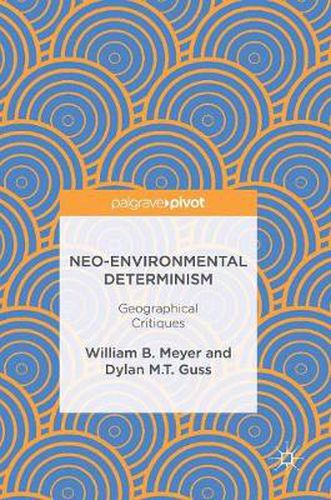Readings Newsletter
Become a Readings Member to make your shopping experience even easier.
Sign in or sign up for free!
You’re not far away from qualifying for FREE standard shipping within Australia
You’ve qualified for FREE standard shipping within Australia
The cart is loading…






This title is printed to order. This book may have been self-published. If so, we cannot guarantee the quality of the content. In the main most books will have gone through the editing process however some may not. We therefore suggest that you be aware of this before ordering this book. If in doubt check either the author or publisher’s details as we are unable to accept any returns unless they are faulty. Please contact us if you have any questions.
This book pulls together major critiques of contemporary attempts to explain nature-society relations in an environmentally deterministic way. After defining key terms, it reviews the history of environmental determinism’s rise and fall within geography in the early twentieth century. It discusses the key reasons for the doctrine’s rejection and presents alternative, non-deterministic frameworks developed within geography for analyzing the roles played by the environment in human affairs. The authors examine the rise in recent decades of neo-deterministic approaches to such issues as the demarcation of regions, the causes of civilizational collapse in prehistory, today’s globally uneven patterns of human well-being, and the consequences of human-induced climate change. In each case, the authors draw on the insights and approaches of geography, the academic discipline most conversant with the interactions of society and environment, to challenge the widespread acceptance that such approaches have won. The book will appeal to those working on human-environmental research, international development and global policy initiatives.
$9.00 standard shipping within Australia
FREE standard shipping within Australia for orders over $100.00
Express & International shipping calculated at checkout
Stock availability can be subject to change without notice. We recommend calling the shop or contacting our online team to check availability of low stock items. Please see our Shopping Online page for more details.
This title is printed to order. This book may have been self-published. If so, we cannot guarantee the quality of the content. In the main most books will have gone through the editing process however some may not. We therefore suggest that you be aware of this before ordering this book. If in doubt check either the author or publisher’s details as we are unable to accept any returns unless they are faulty. Please contact us if you have any questions.
This book pulls together major critiques of contemporary attempts to explain nature-society relations in an environmentally deterministic way. After defining key terms, it reviews the history of environmental determinism’s rise and fall within geography in the early twentieth century. It discusses the key reasons for the doctrine’s rejection and presents alternative, non-deterministic frameworks developed within geography for analyzing the roles played by the environment in human affairs. The authors examine the rise in recent decades of neo-deterministic approaches to such issues as the demarcation of regions, the causes of civilizational collapse in prehistory, today’s globally uneven patterns of human well-being, and the consequences of human-induced climate change. In each case, the authors draw on the insights and approaches of geography, the academic discipline most conversant with the interactions of society and environment, to challenge the widespread acceptance that such approaches have won. The book will appeal to those working on human-environmental research, international development and global policy initiatives.